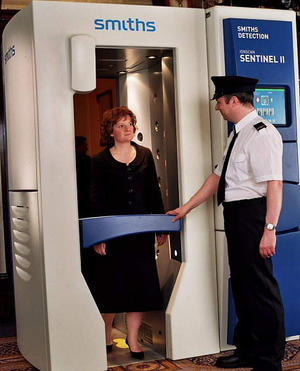Explosives detectionJapan to test walk-through explosive sniffers
Japan will test a walk-through explosive detectors during the November Asia-Pacific Economic Cooperation (APEC) summit; not many details about the Hitachi-built sniffer have been released, but a description of how it operates brings to mind the troubled Puffer Machine, which was tried at U.S. airports in 2008 and later rejected

Walk-through detector from Smiths Detection // Source: airport-technology.com
Japan will test new walk-through bomb detectors that can pick up minute traces of explosives when the country hosts an Asia-Pacific summit next month, government officials said Wednesday.
The Strait Times reports that the system, still in the development and test phase, will be installed on 12-14 November at a train station in Yokohama near Tokyo, the venue for the Asia-Pacific Economic Cooperation (APEC) summit, officials said.
Passengers will be alerted by signs and given the choice of whether to help trial the Hitachi-made system, or whether to pick another gate, under a test that is meant to check for false positives.
Police also hope the new device will act as a deterrent against terrorist attacks during the summit, a police official said.
The walk-through gate works by blowing a stream of warm air that brushes the passing passenger before it is captured by a suction device for chemical analysis of any airborne particles.
Explosives particles can be recognized within two or three seconds, according to the science and technology ministry.
When a person makes or carries home-made bombs, “chemical substances from the explosives can stay on the producer’s hands, clothes or bags… The air jet can blow them off,” said Akiko Kobayashi at the ministry.
The system, which Hitachi claims to be the first of its kind in the world (although the description of it operates brings to mind the troubled Puffer Machine, which was tried at U.S. airports in 2008 and later rejected — see “Puffer machine, RIP,” 27 May 2009 HSNW). It has also been tested at Tokyo’s Haneda airport and in Akihabara, Tokyo’s electrical goods and comic and anime shopping district, since last year.
Security has been tightening ahead of the APEC meetings, which will bring government leaders from twenty-one economies, with more police officers patrolling train stations, airports, parks, and other locations.
The national police said it will mobilize a maximum of 21,000 officers a day when a string of meetings are held from 7 to 14 November, the largest international event in Japan since a Group of Eight summit in 2008.
